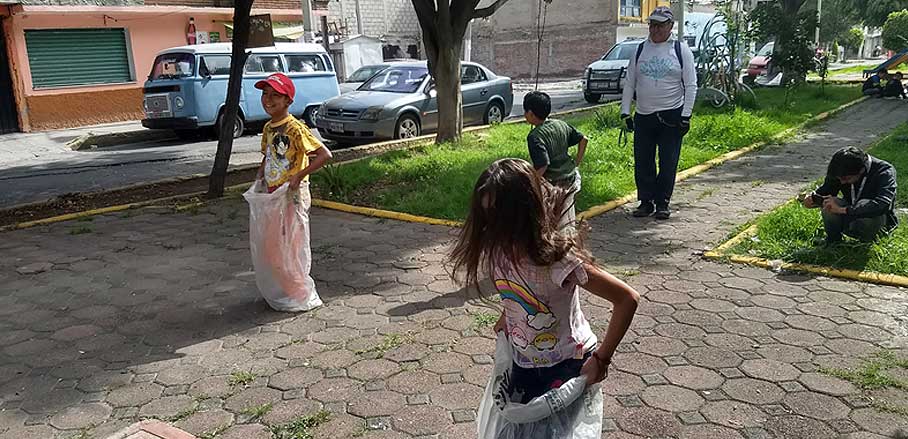Building Community in the East of Mexico City
In neglected parts of Mexican cities, the work of the NGO ENSAMBLE shows how investing into community and togetherness can change poor urban areas for the better, including all residents in a highly participative process.
“They have been told that they’re unimportant so often that they actually believe it”, Carlos Quintero explains. He is talking about the residents of Los Reyes in the far East of Mexico City. Carlos is the founder and director of ENSAMBLE, an NGO dedicated to foster social movements, build leadership, and organise communities in their fight against social exclusion and isolation in Mexico City’s periphery. Their aim is to convince neighbours that by building a stronger community, they will be able to change their neighbourhood towards the better and even get public support.
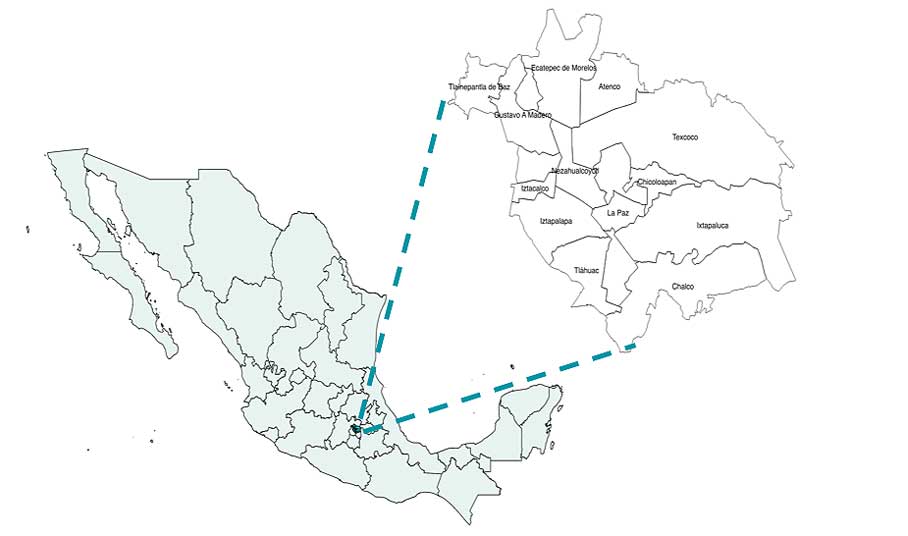
© ENSAMBLE
Neglected East
The neglect of Mexico City’s eastern parts dates back to its colonial past, when they were designated to the native population, and continues to this day. Here, poverty rates are high. Commute for many people is as much as three hours (one-way). Lack of employment opportunities, high delinquency rates, and failing basic services are combined with a dangerous indifference of politicians towards the area, enforcing its marginalisation.
ENSAMBLE encourages residents to work together as a community towards improving conditions in their areas. In doing so, they rely on a three-way approach:
Narratives
ENSAMBLE focusses heavily on building narratives and on community learning. One effect of the ongoing indifference of politicians and other officials has been a lack of data – and thus of history. This has a psychological impact, as it suggests to inhabitants that they are less “worthy” of having their own history than other, better-off parts of the city.
ENSAMBLE provides the missing data through research in libraries, archives, and other sources. They then hand this information over to community leaders to spread. This helps to bring the community together and create a feeling of “belonging” – a step crucial for further action, but one that is too often neglected in development projects. The narrative information is compiled in various formats, including video, to inform other neighbours about existing stories and get them to join.
Trainings
ENSAMBLE offers trainings to marginalised communities. Any interested community member can participate and learn about organisation processes and leadership. Most participants are women, who are mainly self-employed workers or work in informal conditions, but anyway make time for the weekly meetings.
By inviting people of every age to the meetings, many young people are drawn to meetings instead of spending their time with drugs or gangs. Even a 12-year-old boy attends the meetings, where he feels that his ideas are valued and people are listening to him.
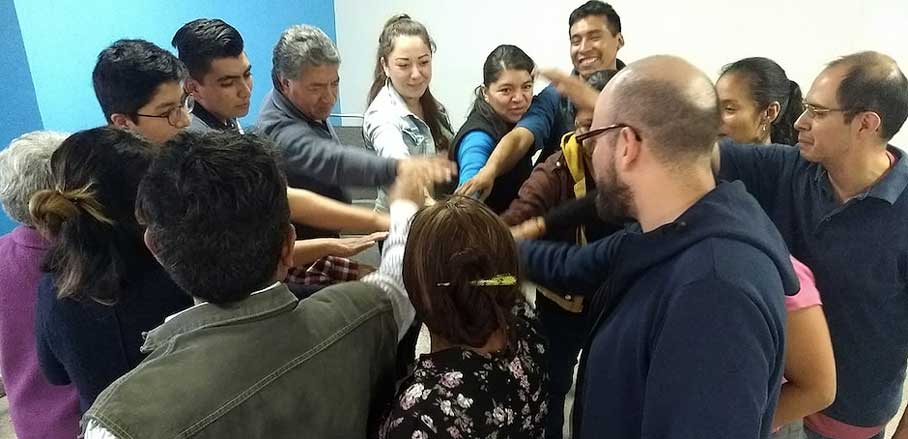
ENSAMBLE team meeting. © ENSAMBLE
Political Leverage
Finally, ENSAMBLE aims at gaining political leverage through joining forces of the community, of collected data, and of successes from past projects, motivating local politicians, organisations, and enterprises to invest more in their own areas.
“Los 500 por La Paz” is a great example of how ENSAMBLE’s efforts translate into action. Through the encouragement of workshops, neighbours in the La Paz neighbourhood decided to start their own project, which will soon encompass 500 people. They meet regularly and work on cleaning public spaces, planting trees, and supporting neighbours in need.
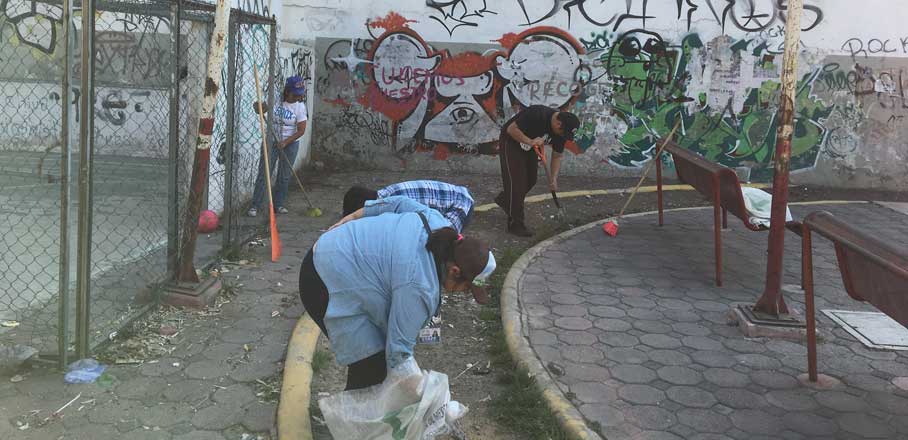
© ENSAMBLE
Results and Successes
By supporting communities, who then go on to found groups or start businesses, ENSAMBLE is doing truly sustainable work. Data analysis shows that people in La Paz are now much more confident and ready to confront their local government wherever necessary.
Importantly, ENSAMBLE is focussing on giving an impulse; what neighbours are doing with their ideas is up to them. In order to gain trust, it is crucial to stress that ENSAMBLE is not doing any magical work. “We are only showing people that they themselves can be the solution and take control of what is theirs by building community”, Sandra, the NGO’s manager, says.
Community is playing an increasingly important role: Until a few years ago, 7 out of 10 neighbours in Mexico have never been part of any group or association; only two people attended the first ENSAMBLE training. This has changed, with some groups now consisting of 500 and more members.
Stronger relations between neighbours alone will not be able tackle the lack of political will. But neighbours self-organise very efficiently and create a sense of “We can get this done”.
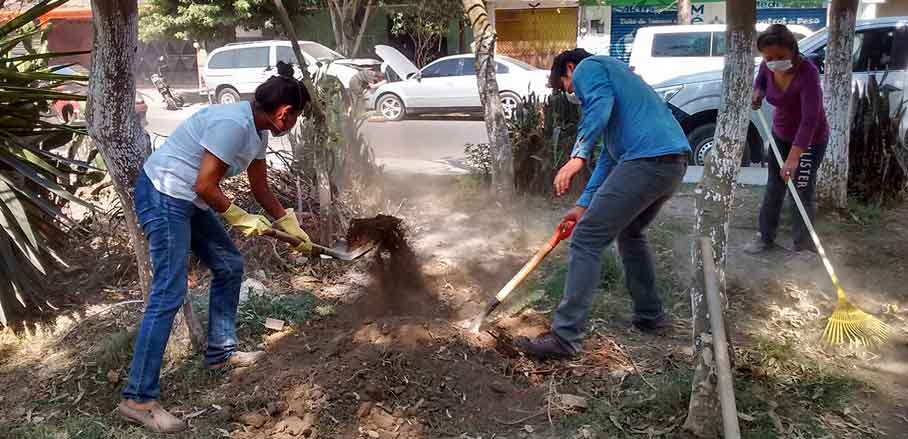
© ENSAMBLE
One of the biggest successes of ENSAMBLE is something you feel rather than count: The fact that people are not indifferent towards the fate of their own neighbourhood anymore. Rather than fighting alone, they are ready to come together as a community, thanks to encouragement from ENSAMBLE.
Of course, there is a big need for political and planning intervention in order to provide better employment opportunities, better infrastructure, and to recognise the value of informal work. But until that becomes a reality, the people in Los Reyes, in La Paz, and other parts of Mexico City’s east are largely left to fend for themselves. This is where NGOs like ENSAMBLE step in to encourage them to retake their power as a neighbourhood.
- Where the Rubber Hits the Road: Localising Climate Action in Cities - 1. March 2024
- Cities and Climate Change: The Buildings Breakthrough at COP28 - 12. December 2023
- Policy and Financing for Net Zero Carbon Buildings: Insights from COP27 - 18. November 2022
